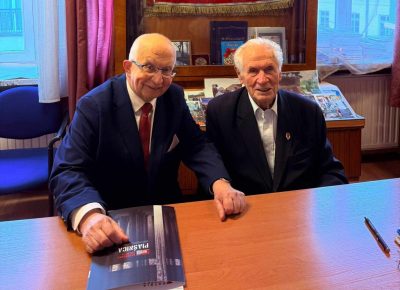"This judgement is a glimmer of hope for Stanisław Zalewski, a survivor of the German Nazi camp Auschwitz," says attorney Lech Obara of the Olsztyn-based law firm representing him, expressing his satisfaction. This hope comes from a Supreme Court ruling which allows for the possibility that Stanisław Zalewski, now 99 years old, will be able to seek justice before a Polish court, rather than a German one.
Lech Obara is not only the head of the Law Office of Legal Advisers and Attorneys Lech Obara & Partners but also the president of the Patria Nostra Association, an organisation that brings together former concentration camp prisoners and their descendants, alongside lawyers, academics, and others committed to defending historical truth.
The idea to establish the association emerged in 2009, when Zbigniew Osewski, and the Lech Obara law firm, acting on his behalf, prepared and filed a lawsuit in the Warsaw District Court against the media conglomerate Axel Springer AG. The publisher of Die Welt was sued for repeatedly using the term “Polish camps” when referring to former German Nazi concentration camps located in occupied Poland.
Formally established in 2012, the association was founded in part as a response to the frequent use of misleading terms such as “Polish concentration camp” or “Polish extermination camp” by various media outlets in reference to Nazi German concentration camps established by Nazi Germany during World War II in occupied Poland.
”The proliferation of such terms leads to a dangerous imprint on historical consciousness – especially among young people abroad – that it was not the Germans, but the Poles who created these criminal camps, which is dangerous for the Polish image and Polish historical policy,” reads a statement on the association’s website. Partly due to Patria Nostra’s commitment, the use of such misleading phrases is decreasing. Nevertheless, the issue persists. In recents texts covering the 80th anniversary of the liberation of Auschwitz, prominent media outlets such as the British “The Mirror” and the American “New York Post” used the term “Polish camp” Following protests by Polish diplomats and diaspora organisations, both publications removed the phrasing from their respective articles.
Zbigniew Osewski lost his case. “The term ‘Polish camp’ is inaccurate and distorts history, but Osewski’s lawsuit against the publisher Die Welt must be dismissed, as the wording did not directly pertain to the plaintiff,” the court ruled. The court further concluded that the prior apology issued by Die Welt was sufficient, and no further apology was required

From left: Lech Obara and Stanisław Zalewski
Subsequently, several former prisoners – including Janina Luberda-Zapaśnik (vs. Focus Online) and Karol Tendera (vs. ZDF, where the court ordered an apology) – initiated legal proceedings against European media outlets for the use of the term “Polish camp.” One such case is that of Stanisław Zalewski, mentioned earlier, who began his legal battle in 2017, supported pro bono by the Lech Obara law firm.
As a former prisoner of KL Auschwitz, Zalewski seeks to hold two German publishers based in Bavaria accountable before a Polish court for using the phrase “Polish extermination camp.”
Lawyers, acting on behalf of Stanisław Zalewski, filed a lawsuit with a Polish court, arguing that the publishers infringed upon his personal rights – specifically, his sense of national identity and dignity. They requested that the court order both media outlets to issue apologies, each pay 50,000 PLN to the Polish Association of Former Political Prisoners of Nazi Prisons and Concentration Camps, and prohibit the dissemination of the terms “Polish concentration camp / Polish extermination camp.” They also obtained the support of the Ombudsman, who joined the case as amicus curiae (friend of the court).
However, lawyers representing one of the German publishers questioned the Polish court’s jurisdiction, arguing that the case should be heard before a court in Germany. Consequently, the Warsaw Court of Appeal submitted a preliminary question to the Court of Justice of the European Union (CJEU), seeking clarification on whether it had jurisdiction to adjudicate the case brought by the former Auschwitz prisoner.
In June 2021, the CJEU issued a negative opinion, ruling that being a Polish citizen alone was insufficient to allow Stanisław Zalewski to benefit from special provisions of EU justice and sue a foreign company before a Polish court.
The Court further held that a court situated within the jurisdiction where the person alleging an infringement of personal rights maintains the centre of their vital interests may exercise jurisdiction to adjudicate a claim for compensation in respect of the entirety of the alleged harm and damage suffered, only where the content published online contains objective and verifiable elements that permit the direct or indirect identification of that individual.
“Learning that the ECJ is unable to determine whose personal rights might be violated by the term “Polish extermination camp Treblinka” is both shocking and disturbing. “With what can only be described as childlike naivety, the judges explain that the individual in question, Stanisław Zalewski, “was not in any way identified, either directly or indirectly, in the published article,” commended attorney Lech Obara at the time.
In December 2022, the Patria Nostra Association lodged an appeal with Poland’s Supreme Court, which, in February 2025, issued a favourable ruling for the former prisoner.
“The Supreme Court’s decision to overturn the ruling of the Court of Appeal marks a major success,” says attorney Lech Obara. Now begins a race against time. Before the Court of Appeal can reexamine the case, the written justification of the Supreme Court’s ruling must be issued — something Obara hopes will happen without delay. “We will do everything in our power to expedite the proceedings so that Stanisław Zalewski can witness justice being served within his lifetime,” adds attorney Lech Obara.
By Igor Hrywa
From left: Lech Obara and Stanisław Zalewski

COMMENTS